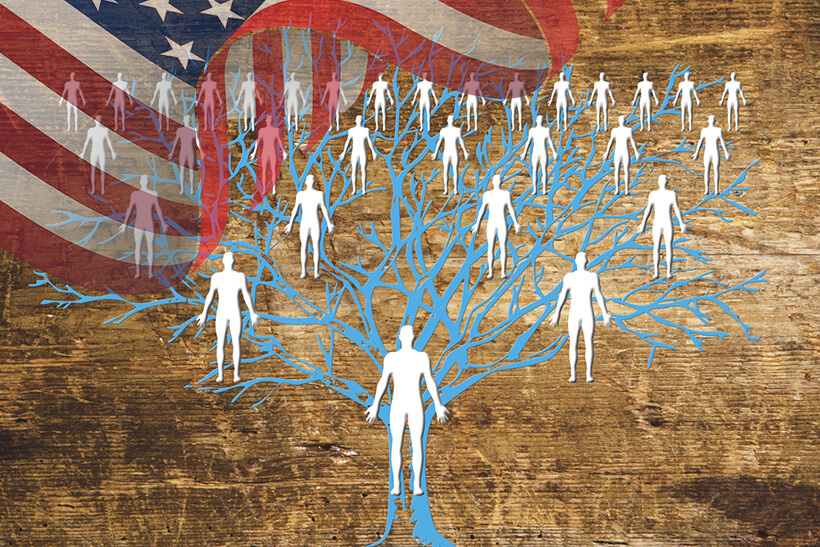When individuals receive their Ancestry DNA results, they often find themselves at a crossroads of excitement, disbelief, and inquiry regarding their heritage. Among the revelations that these results can divulge, the presence of Native American ancestry frequently stands out as a point of curiosity. This unique aspect of one’s genetic make-up not only evokes an emotional response but also propels a deeper exploration into the historical and cultural ramifications of one’s lineage.
Historically, the portrayal of Native American identity has been riddled with mythologization and stereotype. The romanticized images perpetuated by media and literature often overshadow the rich and diverse realities of the various tribes and nations. Consequently, when Ancestry DNA tests indicate Native American roots, it can spark a surge of fascination, but it can also prompt profound questions about authenticity and societal implications. What do these results say about personal identity? How do they fit within the context of contemporary understandings of race and ethnicity?
Initially, it is crucial to examine the methodologies employed by genetic testing companies. Many utilize autosomal DNA testing, which analyzes DNA inherited from both parental lineages. This conjugate analysis can yield percentages indicating the likelihood of ancestral connections to specific populations, including Native American communities. Yet, it is vital to note that these percentages are not absolute; they serve as approximations influenced by the reference databases from which these companies draw their conclusions. The potential for ambiguity raises the question: how reliable are these assertions of lineage?
Moreover, much of the discourse surrounding Native American ancestry in genetic testing intersects with contemporary sociopolitical dynamics. The legacy of colonization and systemic oppression has long severed many individuals from their cultural roots. As a result, the joyful discovery of Native American ancestry often invites contemplation about the historical trauma faced by these communities. Individuals may grapple with feelings of connection to a heritage that has been profoundly affected by centuries of dispossession and marginalization.
As individuals delve deeper into their results, the quest for understanding often leads to historical research and cultural exploration. For many, this search may encompass the examination of tribal histories, oral traditions, and even contemporary advocacy endeavors within Native American societies. Accessing this knowledge can unravel the complexities surrounding tribal membership and identity validation, which in some cases, is predicated on lineage. It invites a critical evaluation of how one’s genetic results align or diverge from the socio-political criteria for tribal affiliation.
Furthermore, it is important to acknowledge that engagements with Native American identity extend beyond mere genetic ties. The essence of identity encompasses language, culture, and shared experiences—elements that are not easily quantified by genetic markers alone. Thus, individuals with a revelation of Native American ancestry may find themselves pondering whether they possess the cultural fluency, community ties, or understanding required to genuinely claim this heritage. This reflection reveals the multi-faceted nature of identity formation amidst a backdrop of Eurocentric frameworks that often dominate discussions of racial and ethnic categorization.
In navigating these complexities, many individuals opt to engage with communities and initiatives that foster connection to Native American culture and experiences. This engagement can manifest in various forms; one might attend cultural events, participate in workshops or discussions, or even contribute to indigenous-led efforts. These interactions allow for the nurturing of relationships that transcend genetic ties and operationalize a more comprehensive understanding of what it means to belong to a community marked by both richness and resilience.
As ancestry DNA testing becomes increasingly popular, the narratives surrounding Native American ancestry continue to proliferate, sometimes leading to contentious discussions about identity and representation. On one hand, such results can illuminate the contrasting trajectories of American history, highlighting how ancestral connections can inform contemporary dialogue about heritage and belonging. On the other hand, the commodification of ancestry testing raises ethical concerns and the potential for cultural appropriation when individuals claim identities without thoroughly understanding the historical and sociopolitical ramifications.
The fascination with Native American ancestry thus serves as a lens through which broader conversations about race, identity, and cultural reclamation can be examined. As individuals pursue deeper knowledge of their heritage, they are often compelled to confront larger structural injustices that impact Indigenous populations today. This critical engagement can lead to a more nuanced appreciation of the complexities surrounding identity and the contemporary realities faced by Native communities across North America.
In conclusion, Ancestry DNA results that reveal Native American roots provoke a multiplicity of responses, ranging from personal exhilaration to societal introspection. As individuals sift through the emotional and intellectual implications of these findings, they often embark on a journey that transcends genetic affiliation, prompting questions about identity, culture, and the interconnections of historical narratives. Engaging thoughtfully with these revelations not only deepens personal understanding but also enhances collective awareness and respect for the enduring legacies of Native American peoples.
